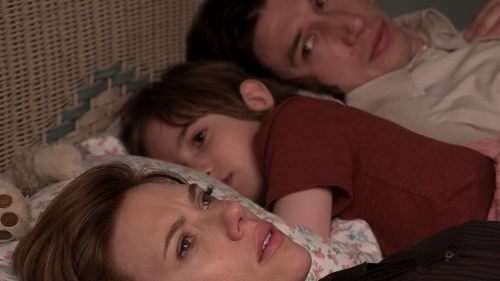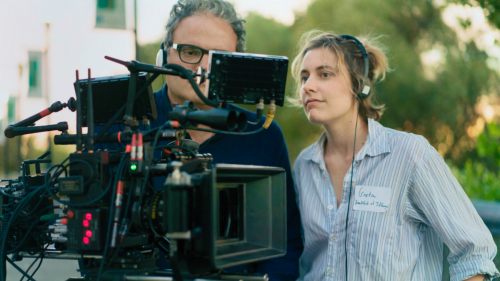WHILE WE’RE YOUNG: Gen X Finds Its Way Between Boomers And Millennials
Spoilers for While We’re Young ahead.
The media narrative has long been that the Baby Boomers and the Millennials hate each other - the Boomers can’t understand this selfie-taking generation of stay-at-home adults while the Millennials blame the grandiose Boomers for cratering the economy - but I’ve always felt they have more in common than they realize. Enormous generations that descended upon the culture like locusts, both the Boomers and the Millennials are social justice-minded, both are ambitious seekers of success, both are flamboyantly creative and both are over-entitled, self-absorbed whiners. No wonder they hate each other.
I suspect that Noah Baumbach sees these generations as mirror images as well, and he structures the meaning of his new film, While We’re Young, around that. The movie is about Baumbach’s (and my) generation, Gen X, the sort of left behind stunted group stuck between these two behemoth cohorts, unsure how to react to either and now, in our middle age, figuring out we might have missed our opportunity to really make an impact.
In While We’re Young Ben Stiller - thanks to Reality Bites one of the iconic faces of Gen X - is a documentary filmmaker living in the shadow of his famous documentarian father-in-law, Leslie Breitbart (Charles Grodin). Stiller’s Josh has been trapped for a decade, working on a documentary that meets his rigid views of how non-fiction storytelling should work - which means it’s a six hour piece of shit. 25 year old Jamie (Girls’ Adam Driver) shows up in Josh’s life, and he claims to be a huge fan of Josh’s earlier work. Jamie, Josh and their wives - Naomi Watts as Cornelia and Amanda Seyfried as Darby - become friends, and the young couple completely energizes the older duo, leading them to lifestyle changes that start to alienate them from friends their own age (including Adam Horovitz, aka Ad-Rock of the Beastie Boys, whose presence lends the film a nice inside joke I’ll share at the footnote*). But before long Josh begins to find Jaime isn’t who he thought he was, and that much of what he found charming and exciting about the young couple is actually hollow and perhaps very calculated.
It’s easy to see While We’re Young as an attack on young people - god knows my girlfriend, a Millennial, felt that way. She walked out of the movie feeling that Baumbach, a filmmaker she truly admired, had just spent two hours explaining why he didn’t like her. I hope she gives his next film, Mistress America, a shot, because I think he (in tandem with his Millennial girlfriend, Greta Gerwig) brings things a bit the other way, but I also think in the end he’s squarely criticizing Josh and Cornelia, not Jamie and Darby. (Some of the sense of it being an attack on young people informed a reading of the movie at the Toronto International Film Festival, where many people thought Jamie was based on indie filmmaker Joe Swanberg, a former creative partner of Gerwig - Baumbach has denied this.)
While the movie leans heavy on Millennial criticism early on - there’s a profound phoniness to how Jamie lives, a try-hard aspect to his insistence on watching VHS tapes and using a typewriter, a less-than generous aspect to his insistence on sharing everything - the pivotal questions of the movie hinge on the value of Jamie’s work. Josh comes onboard Jamie’s new doc because he’s trying to be more open and collaborative; he believes Jamie is making a fluffy Buzzfeed-esque video piece about getting back in touch with old friends through Facebook, and when Josh discovers that the old friend they’ve filmed was actually an Afghanistan vet who was involved in standing up to war crimes, he thinks Jamie has accidentally hit a gold mine of story. But it turns out that Jamie knew the truth all along, and that the friend isn’t even his old friend, but Darby’s. For Josh this is an inexcusable crossing of ethical documentary lines and in the end his big move is to out Jamie to Breitbart, expecting this Baby Boomer titan of documentary excellence to rage against the youngster. Instead Breitbart tells Josh he’s overreacting, and that Jamie has captured something important and that the process stuff that obsesses Josh is illusion.
The Boomer and the Millennial stand on the same page, leaving the Gen Xer crushed between them - a truly fitting metaphor for what has happened to my generation.
The Boomers were the post-WWII generation, defined as Americans born between 1946 and 1964. The Millennials are defined as Americans born between about 1982 and 2000 (the defining years are less solid - some start the Millennial generation at 1980). Both are huge cohorts, with the Millennials actually being bigger than the Boomers. Gen X, meanwhile, sits right in the middle, with a span of 1965 to 1981, two years shorter than both the Millennials and the Boomers (and even shorter if you subscribe to the 1980 boundary for Millennials). While the Millennials came of age in the Great Recession, they spent their formative years largely in the dotcom bubble of the 90s, a period of affluence and stability in America perhaps comparable to the 1950s. The defining decade for Gen X was the 70s, a decade of inflation and deep political and economic uncertainty, certainly a big influence on the general disposition of the generation**.
As a Gen Xer my relationship with the Boomers has always been strained. I love their culture and music, and spent a lot of my youth believing my generation would never make movies or music as meaningful as they did. Coming up in a Boomer-soaked world was alienating, economically - it seemed like the older generation had hit the heights of success and had no interest in moving out of their positions. We were growing up in a world where all the good stuff had already happened, and once the Berlin Wall fell it seemed like we were living in a weird post-history. We could never be as cool or important or do as well as those who had come before. We lived in a massive inferiority complex, one largely informed by the way the Boomers mythologized themselves in all media. By the time I realized I was wrong - that my generation had a lot to offer - we were already out of our short spotlight, replaced by the next generation.
My generation is obsessed with being real - both hip hop and punk, the musical forms that define my generation - have heavy emphasis on keeping it real and not being a poseur. It’s the seeming falseness of Jamie’s movie that drives Josh crazy. Ambition was largely a dirty word to Gen Xers, and we tried our best to act like we were making no effort (thus the entire grunge aesthetic). This becomes Josh’s huge weakness, and it comes, as Breitbart tells Cornelia, from the fact that he always believed what Baby Boomers were telling him. In reality the Boomers turned from hippies into yuppies, but Josh can’t see that. He doesn’t understand the driving ambition that makes him wary of Jamie is exactly what pushed Leslie Breitbart when he was young. In the end Breitbart sees in Jamie elements that he recognizes, elements that were there in his own generation.
The argument about truth and honesty becomes very literal at one point (one of a few moments where Baumbach really gets on the nose with some of his themes) - Jamie and Josh fight about file sharing, with the idea being that Jamie’s generation sees everything as absolutely shareable, that any song you’ve heard is now your song (an attitude not particularly far off from non-materialistic and sharing-heavy hippie ideology). For Jamie this means he, as a documentarian, can co-opt the lives of others in order to tell a more striking story, that he can make the movie about himself, or a version of himself that he presents.
Where I think Baumbach slips up is in his attempt to tie all of this together with a story about Josh and Cornelia having a baby. For a film where many of the jokes and observations about modern life are really on the nose this bit is subtle, and maybe muddled. Josh and Cornelia had been trying to have a baby but have been unable, with Cornelia suffering multiple miscarriages (it’s unclear if their friends know - they keep going on about how the two should be parents, which seems cruel if they did know). In the end Josh and Cornelia adopt a baby, and this is where the film tries to make peace with the honesty and ambition questions. Josh and Cornelia are in an airport, and they see a profile of Sundance frosh Jamie in Vanity Fair. They decide maybe he isn’t so bad, and this is when we learn they’re on their way to Haiti to adopt a baby. The idea of using adoption to represent Josh becoming comfortable with larger concepts of sharing and truth (ie, it’s not his REAL baby, but it will be his baby) is weird, and I don’t think it lands.
But it is the point, and in the end while maybe Jamie isn’t the greatest guy, neither is Leslie (although, again, for a movie where so much is on the nose this could have been better dramatized than just having it told to us). Josh, trapped between these two lumbering generations, needs to find his own way, and needs to synthesize some of what he learned from Jamie. There’s more going on in the film, including a look at the way Gen X is aging in a world where the Boomers blazed a path for eternal childhood, but this is the crux of what While We’re Young is really about - being part of a generation trying to guide its own Argo between the Clashing Rocks, and what it hopes to find on the other side.
*Josh begins to fall out of love with Jamie when he learns the Millennial’s band is named Cookie Puss, after the Carvel ice cream treat whose presence as a terrible TV commercial was such a staple of Josh’s youth. Josh hates that this thing, which Jamie found on YouTube and has no meaning for him, is defining this younger man when it belongs to Josh, who understands it in a way that he thinks Jamie can’t. Meanwhile, Ad-Rock is from the Beastie Boys, once a hardcore punk band that morphed into a white hip hop group. Their first hip hop track? Cooky Puss, a novelty song made up of the band making prank calls to a local Carvel and asking for Cookie Puss. The Beastie Boys themselves are an interesting case study in the lines that define appropriation, and Cooky Puss - a joke track released on a hardcore EP - doesn’t make those lines any clearer. The layers of using Cookie Puss as a sign of Jaime’s inauthenticity thus become deep and funny.
** It’s really important to remember that when we’re talking about generations we’re talking in the broadest possible terms, including tens of millions of diverse and different people under a big, overly broad umbrella.



